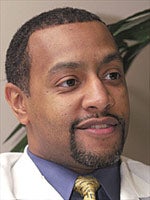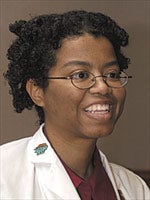Two young African Americans discuss Black History Month
Honoring the past while looking ahead
GREENVILLE, N.C. (Feb. 1, 2002) — Black History Month began more than 70 years ago as Negro History Week at Chicago’s Wabash Street YMCA. The idea came from Carter G. Woodson, who founded the Association for the Study of Negro Life and History in 1915.

Howard
Woodson pressed for the week to honor the contributions of black Americans and, by 1926, had his wish. Woodson chose the second week in February because the birthdays of Abraham Lincoln and Frederick Douglass fell during the month. The week expanded to a month in 1976 through the efforts of the renamed Association for the Study of Afro-American Life and History. The month can be an important learning opportunity for all Americans.
There have been some very significant achievements over the years, not just of African Americans but of all people of color,” said Tyree Walker, vice president of human resources at Pitt County Memorial Hospital. “It’s important for all people to get that education. African Americans are not just athletes and comics.”
Success takes education
Cliff Howard is a fourth-year medical student at the Brody School of Medicine at East Carolina University who plans to become a radiologist. Born in Trinidad, he calls New Brunswick, N.J., a town of 49,000 and home of Rutgers University, his hometown. After marrying, Howard, 33, and his wife moved to Winston-Salem, where he worked as a radiology technologist. He then decided to go to medical school.
“I only applied to one medical school, ECU, because of its commitment to educating minorities,” Howard said recently between clinic duties in the surgery module of the Brody Outpatient Center.
Growing up in New Brunswick, Howard said he realized that education was the best route to success. His eighth-grade science teacher and her woodshop instructor husband saw Howard’s promise and encouraged him to pursue his dreams.
Howard’s black role models include Paul Robeson, an activist, scholar, artist and athlete who played football at Rutgers University and professionally, earned a law degree at Columbia and created a sensation as the character Joe in “Show Boat” singing “Ol’ Man River;” and Dr. Alyce Gullattee, a child psychiatrist and director of the Howard University Institute for Substance Abuse and Addiction.
“I pattern myself after him,” Howard said of Robeson, “because I want to excel in everything I attempt.”
His admiration for Gullattee stems from her commitment to helping others, something he wants to do, too. “I think it’s important to give back to the community, to reach back and help others,” Howard said.
Howard said he also has received plenty of inspiration and support from people of other races. His eighth-grade teachers, for instance, were white, as are many of his ECU faculty physicians. “There are so many attendings here regardless of race who are willing to help,” Howard said.
While Howard said he faces stereotypes, he says those feelings are other people”™s problems that could hinder his own success if he dwelled on them. Instead, he encourages others to learn about their ethnic heritage. “You have to have knowledge of the blood, sweat and tears shed for you to help you achieve your goals today,” he said.

Manuel
“Black history day” every day
Dr. Crystal Manuel is in her internship year of a five-year combined medicine-psychiatry residency at PCMH. The oldest of five children from Fayetteville, she”™s a graduate of the Brody School of Medicine. Even though she went to prestigious Yale University as an undergraduate, admission to medical school was not automatic because her grades were “not the best.” She needed four tries to get in, but she considers that experience to have been good for her.
“It made me realize what struggle was,” she said.
Manuel is philosophical about Black History Month. She thinks it”™s important to recognize the unique experiences and contribut